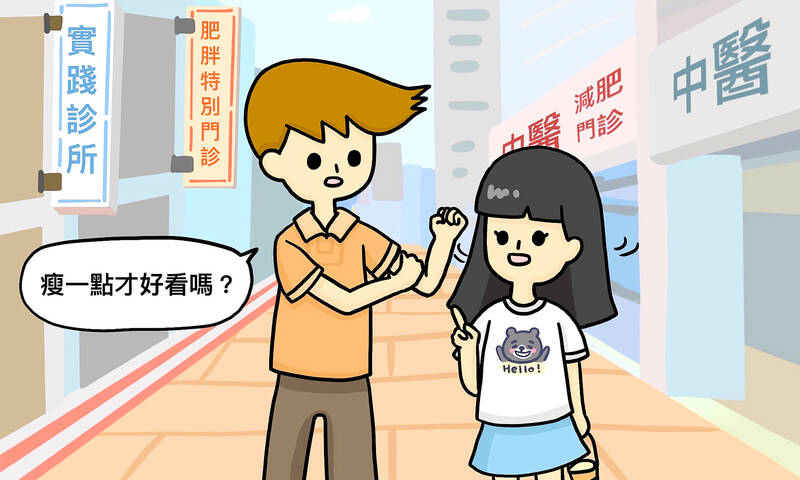馬克:小實,我發現臺北的街道上有好多減重診所喔!
Make: Xiǎoshí, wǒ fāxiàn táiběi de jiēdào shàng yǒu hǎoduō jiǎn zhòng zhěnsuǒ ō!
小實:喔,對啊,因為很多人有這個需求。

Xiaoshi: Ō, duì a, yīnwèi hěnduō rén yǒu zhège xūqiú.
馬克:大家都希望自己變得很瘦嗎?
Make: Dàjiā dōu xīwàng zìjǐ biànde hěn shòu ma?
小實:嗯,特別是女生,很多亞洲人認為瘦一點才好看。
Xiaoshi:En, tèbié shì nǚshēng, hěnduō yàzhōu rén rènwéi shòu yìdiǎn cái hǎokàn.
馬克:太瘦的話,反而不健康吧?
Make: Tài shòu dehuà, fǎn’ér bú jiànkāng ba?
小實:對,有的女生為了追求自己覺得完美的身材,反而犧牲了健康。
Xiaoshi: Duì, yǒude nǚshēng wèile zhuīqiú zìjǐ juéde wánměi de shēncái, fǎn’ér xīshēngle jiànkāng.
馬克:我覺得每個人的身材都不一樣,這很正常,只要健康就好。
Make: Wǒ juéde měigerén de shēncái dōu bùyíyàng, zhè hěn zhèngcháng, zhǐyào jiànkāng jiù hǎo.
小實:我非常同意你的看法,其實這幾年大家的觀念也慢慢地改變了。
Xiaoshi: Wǒ fēicháng tóngyì nǐ de kànfǎ, qíshí zhèjǐnián dàjiā de guānniàn yě mànmàn de gǎibiàn le.
馬克:健康還是最重要的,對吧!
Make: Jiànkāng háishì zuì zhòngyào de, duì ba!
小實:沒錯!
Xiaoshi: Méicuò!
翻譯 Translation
Mark: Xiaoshi, I found that there are many weight loss clinics on the streets of Taipei!
Xiaoshi: Oh, yes, because many people do seem to have this need.
Mark: Do you all want to be thin?
Xiaoshi: Well, many Asians, especially girls, think that they look good if they are thinner.
Mark: If you are too thin, it will be unhealthy, right?
Xiaoshi: Yes, some women sacrifice their health in order to pursue what they think is a perfect body.
Mark: I think everyone’s body is different, and that’s normal, as long as you’re healthy.
Xiaoshi: I couldn’t agree with you more. In fact, people’s ideas have gradually changed in recent years.
Mark: Health is the most important thing, right?
Xiaoshi: Exactly!
單字片語 Vocabulary
1. 減重 (jiǎn zhòng) lose weight
2. 診所 (zhěnsuǒ) clinic
3. 需求 (xūqiú) need
4. 反而 (fǎn’ér) instead
5. 追求 (zhuīqiú) pursue
6. 完美 (wánměi) perfect
7. 犧牲 (xīshēng) sacrifice
8. 其實 (qíshí) actually
9. 觀念 (guānniàn) way of thinking
10. 改變 (gǎibiàn) change
教材音檔 Audio Files
教材影片 Video Files:
https://www.instagram.com/celc.nou_tw/guide/_/17999106352646292/
實踐大學華語中心提供
By Shih Chien University Chinese Language Center: https://chineseusc.com/

In most cities, food waste is often regarded as one of the most troublesome types of waste: it has a high moisture content, spoils easily and produces strong odors. If not handled properly, it can cause serious sanitation and environmental problems. From the perspective of the circular economy, however, food waste is not “useless leftovers,” but rather an organic resource that has yet to be effectively utilized. The core principle of the circular economy is to break away from the linear model of “production–consumption–disposal,” allowing resources to circulate repeatedly within a system and extending their useful life. Food waste occupies a

In June, headlines shocked the art world when a visitor damaged a 17th-century painting at the Uffizi Galleries in Florence, Italy, while posing for a photograph. This was not an isolated event. Recently, similar disasters have been reported worldwide, from a child damaging a Mark Rothko painting to a tourist breaking an exhibit by pretending to sit on it. Such incidents highlight why museum etiquette is increasingly crucial. First, we must recognize that art and historical objects are fragile. Once damaged, they may never regain their original condition. Many common actions, though harmless at first glance, can have grave consequences. For

A: Google has unveiled its 2025 Year in Search chart. No. 10 to No. 6 are: Typhoon Podul, Chinese drama “Love’s Ambition,” tariffs, US President Donald Trump and singer Khalil Fong’s death. B: Wow, actress Rosy Zhao’s new drama is so popular. So what are the top five? A: No. 5 to No. 1 are: Gemini, hanzii.net, NT$10,000 cash handout, entertainer Big S’ death and earthquakes. B: Hasn’t Trump topped this year’s most-searched people chart? A: Yup, and he’s closely followed by cheerleader GuoGuo Chiang at No. 2, whose husband Zack Fanchiang is also at No. 8. Apparently, people are curious about her extramarital

Continued from yesterday(延續自昨日) The study also uncovered a correlation between breathing patterns and mental well-being. Participants with higher scores on anxiety questionnaires exhibited shorter inhalation periods and more frequent breath pauses during sleep. “We intuitively assume that how depressed or anxious you are changes the way you breathe,” says one researcher involved in the study. “But it might be the other way around.” If this proves true, then training people to adjust their breathing may offer a novel approach to managing conditions like anxiety or depression. 該項研究也揭露了呼吸模式與心理健康之間的關聯。在焦慮問卷得分較高的受試者於睡眠期間表現出的吸氣時間較為短促、呼吸中止更為頻繁。一位參與研究的學者表示:「我們直覺地認為憂鬱或焦慮的程度會改變你的呼吸方式,但有可能是反過來的情況。」如果這一假設得到證實,那麼訓練人們調整呼吸的方式,可能會成為管理焦慮或憂鬱等疾病的新穎方法。 What Did You Learn? 1. What problem did scientists previously face when trying to measure breathing patterns? 2.